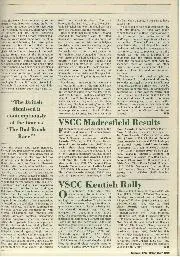
VETERAN TO CLASSIC - VSCC Kentish Rally
On September 18 the VSCC rally-scene moved to Kent, when 57 drivers and their navigators set off hoping to win the Measham Trophy, in this scheduled time event. Doing a…
COLOMBIA.
Where all motoring is in the nature of a sporting event.
IMAGINE a country with an area more than equal to that of Great Britain, Germany and France put together, as rugged as the Pyrenees or the Alps but on a grander scale ; such is Colombia. It lies to the North and North West of South America. The obvious vehicle for centuries was the horse and the mule. However, motoring made an early appearance in the form of a Peugeot Voiturette imported by a private individual as far back as 1899, but it was not a success : the roads were too bad and the motor too weak.
When it appeared in the streets all the urchins laughed and threw stones and nearly everybody thought the owner crazy, except a few far-seeing people who saw the dawn of a new era in the uncouth little contraption with its spidery wheels and spluttering engine.
It took fully ten years for the first real motor to arrive inland. A syndicate was formed to subscribe the money and import a car. The car came in the shape of a big red seven seater Pullman of American manufacture. It was imported in sections, on mule back remember ! and put together by local mechanics, quite unfamiliar with such machinery. The oil and petrol incidentally had also to be imported. After weeks of trials and experiments the great day came, and the car made its first successful tour through the streets to the principal square amid a mixed chorus of cheers, cat calls, and banging from its own exhaust. The car had won despite the scepticism of those who distrusted the new-fangled creature. Why, with the cost of it and its food one could buy a hundred pack mules and feed them for a year. It must have cost £2,000 to get it on the road, but in spite of all, the car had got there and it told its tale.
Car followed car in increasing numbers as transport difficulties were overcome. Meanwhile, oil had been found in Colombia, a refinery established and its presence, of course, helped and stimulated motoring considerably. But the great problem remained, there were not enough suitable roads, their mileage was insignificant, and road construction in that type of country was an appalling task, and yet, the roads have been built and it is the car that has built them. There are only a few hundred miles so far ; there will be thousands soon.
The purely sporting side of motoring has not developed much, but the keen competition of local American car agents led to a Cadillac doing battle with a Stutz over a winding road which ended in a victory for the Stutz, the Cadillac running off the road.
Only recently the motor cycle has made its appearance and it.3 success was assured from the outset. It could not be otherwise, Colombia is pre-eminently a country of individual transport. Every Colombian is a horseman by temperament and training, and the motor cycle is a steel horse which goes faster and farther and does not complain. The big Harley Davidson and four cylinder American machines hold sway, for the grades out there are such that to stop and let the motor cool is a frequent occurrence. Nothing less than a ” five-hundred ” is any good because it must pull on top. In short, it must be every inch a motor cycle if it is to be any use in that country of gruelling climbs.
There is the greatest enthusiasm prevailing about anything that has to do with roads and roadrnaking. About a year ago an enterpri . ing business marlin Medellin suggested that a road should be built to the sea about four hundred miles away through very difficult country, such as is seen in the photographs. There was a certain amount of opposition ; people said that the railroad and the river Magdalena was eliough, but the idea matured, a loan was raised, and the work is under way. A distinctive feature is the personal interest taken in the work, as shown by the fact that a typical afternoon run is to go to the end of the” Carretera al mar” to see how the work is getting on, also additional funds are being raised by making an issue of stamps in the same way as stamps have been used for collecting for hospitals, etc. Mach has to be done at the present stage of devel pment aid there are many difficulties, but the new roads are well engineered and the surface, although
not first class at the moment, could be much worse. Motoring under all its aspects, one ..ee13, has undoubtedly a great future in that country, for more vehicles mean more roads, and when the roads are built the people will want more cars in order to use the roads.
As a touring ground it will be wonderful for there are all the natural resources to please the tourist, there are ideal situations for health resorts to be established, sulphur springs and glorious scenery and a pleasant warm sunny climate, while higher up there are glaciers and tracts of land permanently covered in snow where the winter sports enthusiast can disport himself. Every kind of climate condition exists in Colombia, as the land rises steadily from sea level, where tropical conditions prevail, to over 17,000 feet in the interior, and the motorcar or cycle is the obvious means of making the most of the country.